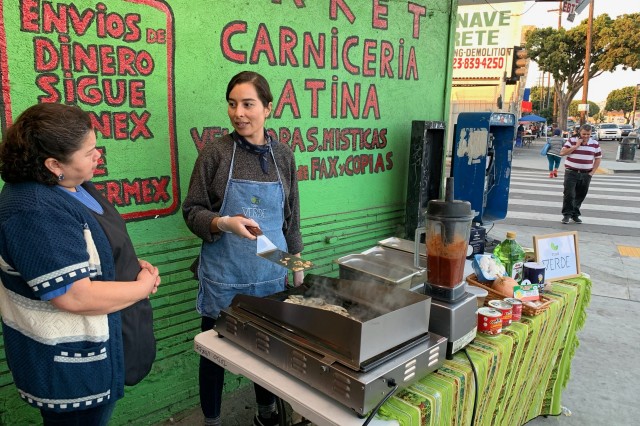Angelenos Building Community: Celebrating Madin Lopez, ProjectQ
Using Hair as a Form of Social Justice
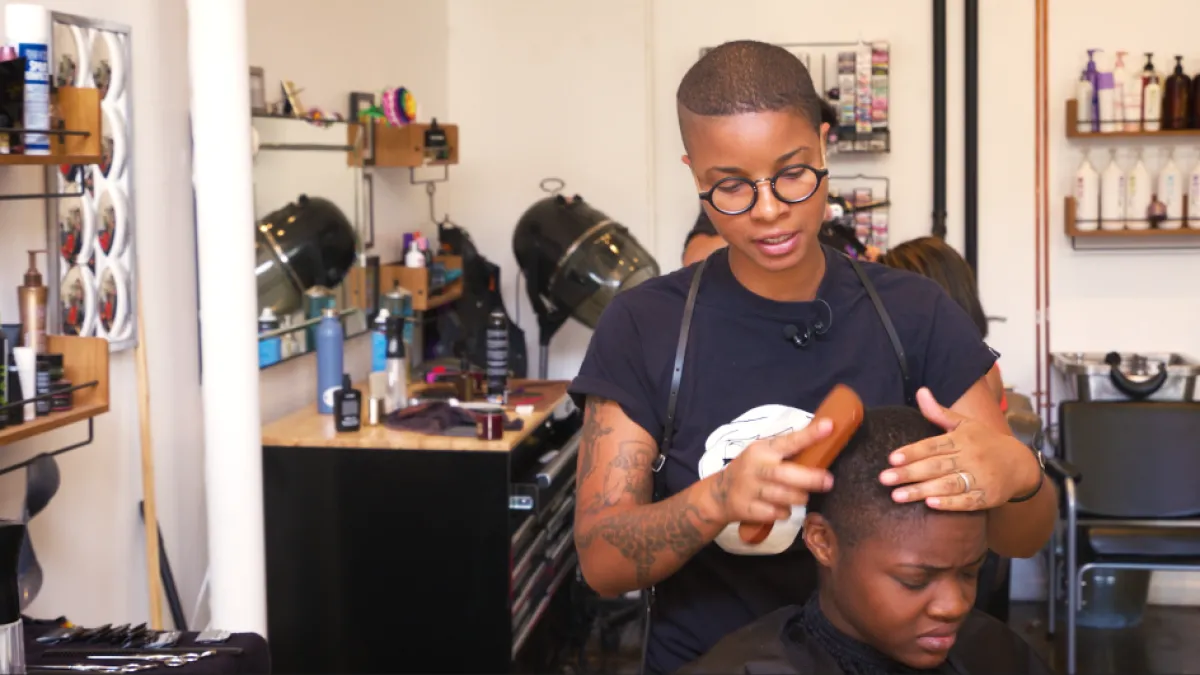
Angelenos Building Community is a series of stories from a diverse range of Angelenos and the work they do in support of their community in Los Angeles. The Natural History Museum of Los Angeles County is committed to uplifting the voices of community members who strive to create an equitable, accessible, and inclusive community for all.
Meet Madin Lopez (they/them/theirs)

Madin Lopez founded ProjectQ because they wanted to focus on creating a generation of homeless queer youth that love themselves. In 2013, Madin volunteered at the LA LGBT youth shelter on Highland, giving haircuts to about 30 homeless youth a month. Madin has since purchased a vintage Airstream, converted it into a mobile self-esteem building hair salon (named the “Hairstream”) and they have driven it across the United States providing haircuts to homeless LGBTQIA+ youth. In 2018, they opened the ProjectQ Salon & Community Center in the Chinatown area. Madin now provides free gender-affirming haircuts and mentorship workshops to over 700 homeless LGBTQIA+ youth annually. During the pandemic, Madin’s organization has become nimble and continued to support their community by hosting virtual haircut training workshops, and delivering food and hygiene boxes. Learn more about ProjectQ .
Watch a video interview between Val Hatcher, Gallery Interpreter, and Madin Lopez, founder of ProjectQ, as they discuss ProjectQ and Madin’s journey in working, living, and building community in Los Angeles.
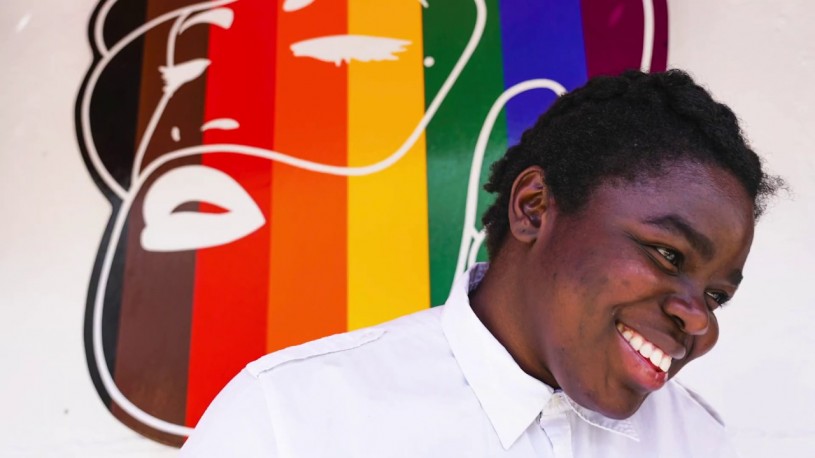
Interview Facilitator
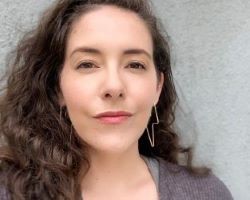
Val Hatcher is a Gallery Interpreter at NHM and the La Brea Tar Pits. A California native, she studied theater and professional writing. Museum education, for her, is about authenticity, storytelling, and unraveling misconceptions. She lives in Los Angeles.
Can you tell us a bit about yourself, Did you grow up in LA?
I grew up all throughout the Los Angeles area, mainly in the San Fernando Valley. I was raised by a single father and had sparse contact with my mother, who was often homeless or incarcerated. The hair salon quickly became the place where I could create community and autonomy. I was seven years old in April 1992, when the civil unrest all but mirrored that of today. My young mind mourned, with little understanding of what the future would hold for someone at my intersections. Four years later, I came out of the closet and suffered so much physical abuse that I was sent into foster care. The foster homes stretched from East LA to Pasadena, and even Palmdale. One of them was run by a black hairstylist. She helped me reclaim the autonomy I had lost by being a part of the system. A commonly overlooked structure of oppression is that of the foster care to homelessness pipeline. By owning every bit of my story, I was able to create ProjectQ.
Can you tell us a bit about your job/career?
ProjectQ is a salon and community center in Los Angeles where haircuts and programming provide social justice and healing. We invite queer youth of color to our safe space to be seen heard and loved by a family. It all started on the mobile self-esteem building salon, “The Hairstream,” where we did 700+ haircuts for youth all over the country, starting at the LA LGBT center’s youth shelter. Initially, we wanted to create a place for our youth to come into their own while giving a much-needed break from the shelter. What I had not anticipated was how it would, in turn, help me have patience in decision making, and work as my full-time salon while searching for the right place to open the ProjectQ Salon and Community center. Nestled between the beautiful Chinatown train station and historic Olvera street, we found a place to call home. As our stability expanded, so did our team. We wasted no time hiring some of our youth experiencing homelessness that were in search of a safe workplace to hone their skills and reintegrate into society.
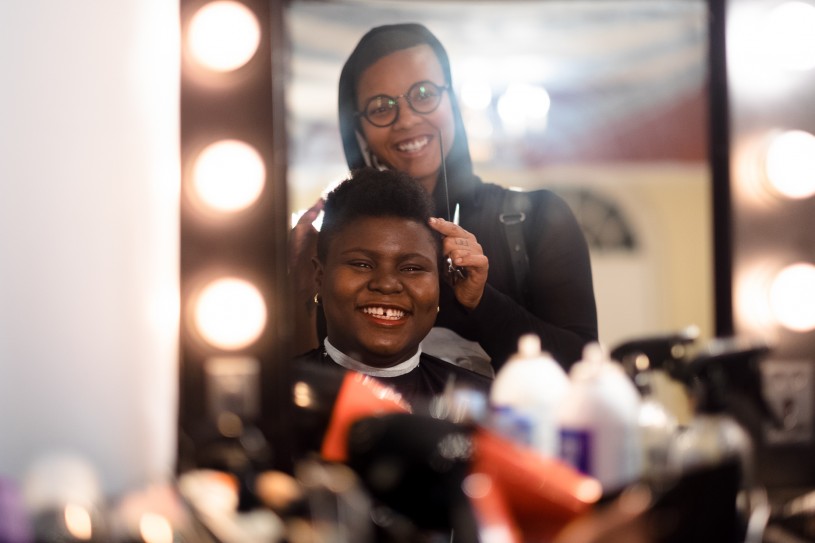
How do you incorporate the community in your work?
Our model is unique; when clients purchase a hair service, they are also contributing to service for queer youth of color experiencing homelessness. Every second Sunday of the month, we offer our services, but with a little twist. The youth “pay” for their services by taking our free self empowering workshops, like financial planning, nutrition on a budget, meditation, and more. The workshops are taught by queer community members of color. By centralizing our community elders, our youth are given the opportunity to envision themselves in leadership roles. COVID-19 has shifted the way in which we can give service, but our mission of empowerment and radical self-love stays strong. We have hit the road, driving all over L.A. to distribute food and hygiene boxes to the youth whose hair we would normally be sprucing up for summer. Programming has gone virtual, our network of LGBTQIA+ businesses continue to donate their time and artistry in Instagram LIVE videos, with a ‘how-to’ format. It has been imperative for us to maintain connection and communication with our young community members. Their emotional and financial stability was fragile even before the majority lost their jobs due to pandemic cutbacks.
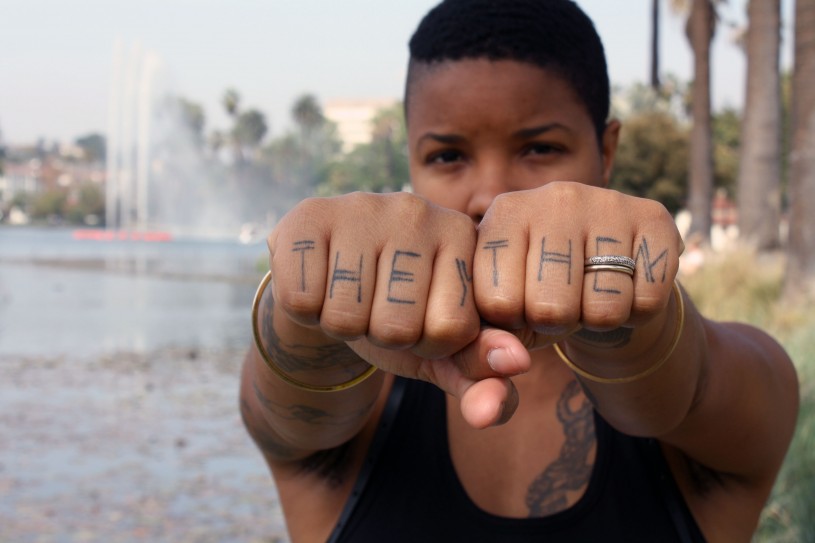
What does being an Angeleno mean to you?
People come here to dream, whether they are chasing the limelight, or escaping terrifying circumstances from their countries of origin. Understanding our racial and cultural history, while advocating for those whose future is dictated by circumstances that are out of their control. There is an archetype of a ‘Homeless' person that is not at all accurate or mindful of the realities of the world we live in today. The folks that serve you coffee clean your car and hand you a towel at the gym are leaving their jobs, and sleeping on the streets. And with the pending drastic economic shift, this will become an even more common occurrence. Some families benefit from intergenerational wealth, passed down property, and businesses. Unless we live in the home where you were born, taking over the family business, then following our dreams automatically means that we exist in a separate class than those around us. Being an Angeleno or, in my case, an Angelenx, means that I take into account every part of L.A. Not only geographically but socio-economically. Loving L.A. for the deeply complicated city that it is, and holding it accountable for what I know it can be.
